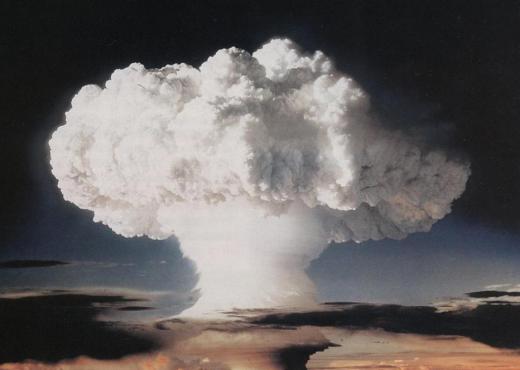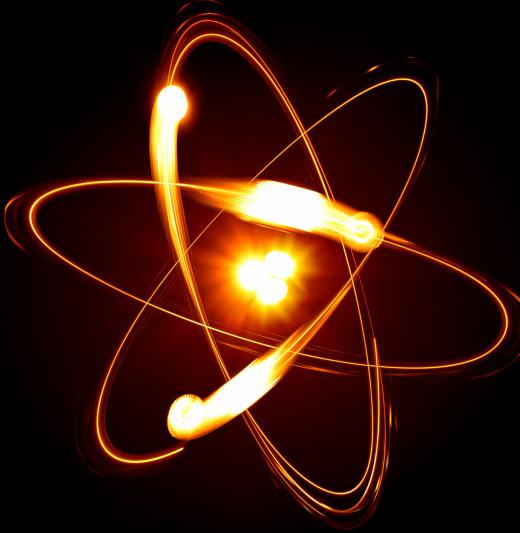What is Neutron Radiation?
 Michael Anissimov
Michael Anissimov
Neutron radiation is a form of ionizing radiation most often found in nuclear reactors and nuclear bombs. It is composed of neutrons, neutral subatomic particles that make up the nucleus of atoms along with protons. Neutrons are found in all elemental nuclei except for hydrogen. Neutron radiation is a health risk and is considered the fourth major type of radiation after alpha particles, beta particles, and gamma rays.
Neutron radiation, and the neutron itself, were discovered in the early 1930s through experiments conducted by James Chadwick, Walter Bothe, Herbert Becker, and others. The radiation was released by bombarding the metal beryllium with alpha particles. Chadwick’s careful work in proving the existence of the neutron earned him the 1935 Nobel Prize in Physics.

The most famous role of neutron radiation in world history comes from 1942, when the world’s first nuclear reactor, Chicago Pile-1 was built underneath the University of Chicago's stadium. Scientists had theorized that energy would be released by bombarding the unstable uranium nuclei with neutrons. Furthermore, by breaking apart (fissioning) these uranium nuclei, a self-sustaining chain reaction could be initiated. The ultimate form of this is in a nuclear bomb, where an extremely quick sequence of nuclear reactions causes the release of a substantial amount of the nuclear energy in a core of enriched uranium, enough to blow away entire cities. Prior to the early 1940s, few scientists, not to mention the general public, could possibly have imagined such a powerful explosive or energy source.

Neutron radiation has the tendency to be absorbed by the nuclei of its target material, turning it radioactive. Most of the radioactive material produced during the explosion of a nuclear bomb is created in this fashion. When humans are exposed to too much neutron radiation, it can actually turn flesh radioactive, quickly killing the unfortunate person. This is the principle behind the neutron bomb, a weapon designed to release massive amounts of neutron radiation with comparatively little heat or light. The neutron bomb is a nuclear explosive that kills people and animals but leaves structures intact.
AS FEATURED ON:
AS FEATURED ON:















Discussion Comments
I really wish this stuff wasn't so harmful for so long after a nuclear reaction. One of my friends works for a French nuclear power plant and she says that a lot of research goes into figuring out ways to process and dispose of the material used. You can't just dump it, because the neutron radiation can harm everything around it.
They have a pretty good method of recycling leftover radioactive material now, so they can use it more than once in the power plant, but unfortunately, it refines the material until it is much closer to the stuff needed for making bombs. So they then have to make absolutely sure no one gets their hands on it.
Radiation has its uses but it is a pain in the butt. When you think about how much better off the world would be if everyone could just have a safe nuclear power plant in their back yard it's a real shame.
@bythewell - To be honest the thing that makes me more nervous than governments is terrorism. People have proved that it's not impossible to build a nuclear reaction in your basement. Just ordinary people (although, more often than not, they are quickly discovered because of the radiation leaking everywhere and radiation detection surveillance).
What scares me is the idea that a single person could decide to make a neutron bomb and let it off. So I don't think it's a bad idea to keep a bomb shelter handy if you happen to have room for one.
@trullieok - Honestly, my first reaction is to say, the best way to shield yourself is to make sure your political leaders are doing everything they can to promote world peace.
I read a lot of books on nuclear fallout while growing up during the cold war and it's easy to see why everyone is so terrified by the prospect. The initial blast is bad enough, but the people exposed to that will die right away. The worst thing is the radiation afterwards and the possibility of it getting into the atmosphere and the waterways.
A neutron bomb is terrible, but all nuclear bombs are terrible. The trick is to make sure no one ever has to use them.
I work with neutron and gamma sources on a regular basis. If you want to shield yourself from neutron radiation, the simplest way is water. Unlike gamma rays, the neutron radiation is not readily stopped by a layer of lead. --H
Wow, this sounds really scary, especially with the potential of a neutron bomb. Are there any precautionary measures we can take to avoid acute radiation exposure in case of a leak or bomb?
Post your comments